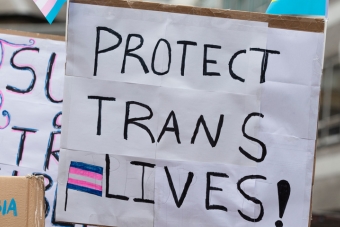Educating on Trans Rights: International Trans Day of Visibility

Written by: Anthony Dallozzi, Communications Manager
On Tuesday, March 25, 2025, The Advocates for Human Rights was invited to join a Big Four Accounting Firm
as they recognized the upcoming annual International Trans Day of Visibility. Around the table were myself and nine other individuals committed to better understanding the needs of the transgender and gender non-binary community. The conference room was full, and we were joined by additional
Big Four Accounting Firm
staff who attended through Zoom. There was a sincere desire to learn more about the resiliency of the trans and gender non-binary community by all in attendance and how each person could better support this community.
E.M., a member of the
Big Four Accounting Firm
team, started the conversation by sharing her personal story with the trans community. She, like many people were first exposed to gender-queer people by the negative and harmful character of Buffalo Bill from ‘The Silence of the Lambs’. It would be another twenty years until the subject of trans and gender non-conforming people would be a presence in her life. E.M. eventually married her high school sweetheart and after three years, her then-husband came out as a transgender woman. It was this experience that broke the negative and irrational stereotypes she held around transgender people and others who were not cisgender. The allyship that E.M. showed her former partner was an example of strength and unconditional love. While their relationship no longer worked as a marriage, they have remained friends. E.M. continues to be an advocate for the transgender community.
“The reports we write for the UN are a tool for those who may have little to no options to advocate for their communities in their own country. These reports allow them to lift up their voices.”
Nathan Madson, JD, PhD, Managing Attorney, International Justice, at The Advocates for Human Rights then began their presentation. Nathan (he/they) is an accomplished human rights advocate, educator, and interdisciplinary scholar. He works with a global network of LGBTIQ+ advocates, focusing on reporting for the United Nations.
They took us through some of the various issues around the world that transgender and gender non-binary people face. These issues include, but are not limited to, a lack of legal gender recognition (not being able to change their gender on identity documents); the criminalization of consensual same-sex sexual activity; considerable discrimination against transgender people, even within the LGB community; and violence by government actors and private citizens.
There was special attention given to the experiences of transgender asylum seekers and refugees. Transgender and gender-diverse people in the immigration system often don’t have documentation that matches their gender expression. This can cause considerable problems, as it delays or outright prevents transgender people from receiving protection, causing further victimization for those fleeing persecution.
Focusing on the United States, there were specific examples of attacks coming from the Trump administration. These include Trump’s executive orders (EO). The EOs attack the transgender community under the guise of protecting women and girls, rejecting so-called “gender ideology,” and only recognizes sex assigned at birth. The administration relies on a faulty binary understanding of biology that ignores intersex people and attempts to define transgender people out of existence. Further, the Trump administration is denying certain government employees insurance coverage for gender-affirming care for the dependents. They are ending gender-affirming care for people in federal prisons and reassigning them to a prison that corresponds to their sex assigned at birth, putting them in significant danger. These actions again victimize transgender and gender-diverse people. The executive orders don’t stop there. They also permit a ban on transgender people from the military, citing that they are unfit to serve in the military and not truthful. Restricting transgender women from sports is another attack on these individuals as well.
Unfortunately, the Trump administration has also gone further by attempting to erase the transgender community from history. They have removed “transgender” from the Stonewall National Park website. This drives a wedge between lesbian, gay, and bisexual (LGB) people and transgender people, despite the fact that the Stonewall riots that sparked the LGBTIQ+ rights movement in the U.S. was led by two trans women.
Madson ended the presentation by telling us that there are actions we can take. The four actions are:
- Listen to and support transgender people
- Donate your time and money to organizations that serve or are run by transgender people
- Be aware of the issues and demand politicians to end the dehumanization of trans people
- Treat transgender people with kindness and humanity
In these difficult times it is important to remember that those in LGBTIQ+ communities need the allyship shown by our cisgender peers, friends, and family. The voices of transgender and gender non-binary people hold their lived experiences and need to be heard, respected, and amplified.



